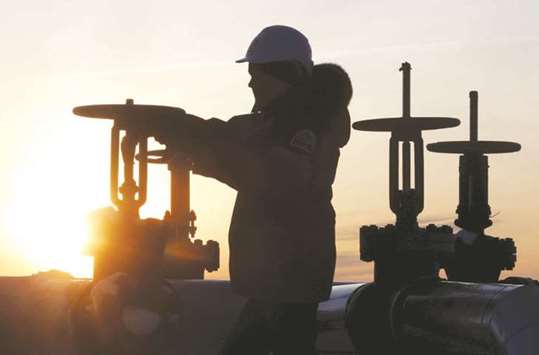Oil extended a two-year high above $60 a barrel in London amid growing signs that Opec and Russia will press on with supply curbs, and a brief disruption in exports from Iraq’s Kurdish region.
Brent crude futures added 0.4%. Saudi Arabian Crown Prince Mohammed bin Salman last week backed extending production cuts by the Organisation of Petroleum Exporting Countries (Opec) and its allies beyond March, following a similar endorsement by Russian President Vladimir Putin earlier this month. Iraq’s Kurds resumed oil exports to Turkey after a short suspension, highlighting uncertainty in the region, which in September voted to secede from the rest of the country.
“High Opec compliance” and “roaring oil demand growth combined over the last few months have accelerated the rebalancing of the oil market,” said Giovanni Staunovo, an analyst at UBS Group AG in Zurich. “Reports that Saudi Arabia and Russia are mulling over the prospect of an extension” have “played a part in buoying market sentiment and recently lifting oil prices.”
Both Brent, the benchmark for more than half the world’s oil, and US marker West Texas Intermediate crude have jumped in October amid speculation that Opec and partners including Russia will prolong output cuts aimed at reducing a global glut. World stockpiles are down to about 160mn barrels above the five-year average and prices are heading towards “fair” levels, according to Qatar Energy Minister HE Dr Mohammed bin Saleh Al Sada.
Brent for December settlement, which expires on Tuesday, rose as much as 45¢ to $60.89 a barrel on the London-based ICE Futures Europe exchange, the highest since July 2015. It was at $60.67 at 1:21pm in London. Prices gained 4.7% last week. The global benchmark crude traded at a premium of $6.59 to WTI.
WTI for December delivery was at $54.11 a barrel on the New York Mercantile Exchange, up 21¢. Volume traded was about 36% below the 100-day average. Prices on Friday advanced 2.4% to $53.90, capping a 4.7% weekly gain.
Iraq’s semi-autonomous Kurds began pumping oil again to Ceyhan, Turkey, at about 1:25pm local time after Kurdish crude stopped arriving at the Mediterranean port at 4am, the port agent said by email. Information on the amount of oil flowing wasn’t immediately available, the agent said.
The halt came days after Iraqi troops captured oil fields from Kurdish fighters in northern Iraq’s disputed Kirkuk province. Shipments by pipeline averaged 264,000 barrels a day before the stoppage, less than half their normal daily level of 600,000 barrels. Exports from Kirkuk, which had been flowing through the same pipeline network to Ceyhan, remained halted as of on Monday, the port agent said.
Iraq added a fifth offshore crude-exporting facility with a capacity of 900,000 barrels a day to boost shipments by sea, the nation’s oil ministry said in an emailed statement, citing Minister Jabbar al-Luaibi. The financiers and corporate chieftains gathered for Saudi Arabia’s ‘Davos in the Desert’ heard the same message again and again. From the crown prince down, Saudi leaders wanted no room for doubt: the initial public offering of oil giant Aramco is “on track” for 2018.
Among US explorers, the new emphasis is on getting the most output possible with wells that now can run horizontally for miles, as well as putting into service drilled-but-uncompleted wells that need to be fracked.
Drillers added one rig last week, according to data released on Friday. American crude production climbed by 1.1mn barrels a day in the week ended October 20. Hedge funds boosted their Brent net-long positions — the difference between bets on a price increase and wagers on a drop — by 2.6% to 506,737 contracts in the week ended October 24, according to data from ICE Futures Europe.

A worker checks the valve of an oil pipe at the Lukoil company outside the West Siberian city of Kogalym, Russia. Brent for December settlement, which expires on Tuesday, rose as much as 45u00a2 to $60.89 a barrel on the London-based ICE Futures Europe exchange, the highest since July 2015.
